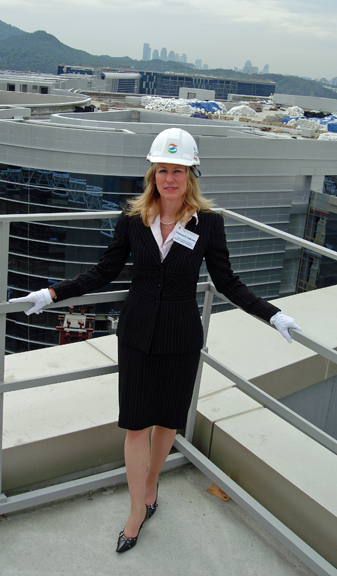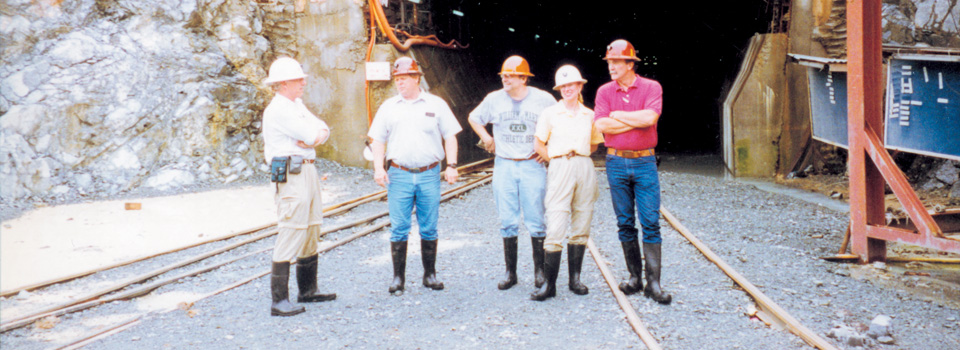Patricia Galloway: Rising to the challenge
Patricia Galloway: Rising to the challenge
| Author: | Kim Medaris Delker |
|---|---|
| Magazine Section: | Always |
| College or School: | CoE |
| Article Type: | Issue Feature |
| Feature Intro: | In high school, Patricia Galloway envisioned herself becoming a lawyer, an interior designer or maybe even an interpreter for the U.N. |
Galloway, who was born in Lexington, Ky., never took a calculus, physics or chemistry class, but she did like to draw. She experienced her lightning-bolt moment during a career day presentation from a University of Kentucky professor who displayed beautiful renderings of buildings on the wall.
“I raised my hand and said, ‘Do civil engineers draw like that?’ ‘Oh, yes,’ he said. ‘And the engineering profession needs more young women like you. You could easily write your ticket to do whatever you want to do!’ I was sold! I could not believe how excited I got,” Galloway remembers.
Despite being told by teachers and guidance counselors that she would flunk out because they feared she couldn’t handle engineering, the Lexington, Ky.-born Galloway rose to the challenge, earning a bachelor’s degree in civil engineering from Purdue in 1978.
And rising to the challenge is exactly what Galloway has done her entire career.
Galloway has more than three decades of experience with offering senior management strategic advice and consulting to identify and manage risk, assess projects, project trends and maximize a company’s performance. She is currently president and CEO Pegasus Global Holdings Inc. in Cle Elum, Wash., where she is responsible for the firm’s management consulting and services.

Galloway also is an arbitrator in both domestic and international arbitrations and is a member of the board of directors of the American Arbitration Association.
In 2006, she was appointed by President George W. Bush to the National Science Board, where she served as vice chair from 2008 to 2010. In 2004, she was elected president of the American Society of Civil Engineers, the first woman to hold that job.
She earned an MBA from New York Institute of Technology and a PhD in infrastructure systems from Kochi University of Technology in Japan.
Galloway offers her viewpoint on attracting women into engineering, what she envisions as the future of the field and her recipe for success.
What do you see as the most important issue or issues facing STEM education today?
First is how to attract young people into STEM education. Second is how to train our teachers about how to excite kids on STEM and then how to teach about subjects such as engineering.
You have mentioned that engineering education is the No. 1 challenge facing engineers today, as current education doesn’t provide the soft skills needed to be effective. What is your solution to encourage or increase this education?
I believe it is possible to incorporate soft skills into the engineering curricula by having classes where the professors require more writing and speaking opportunities. I also think it is important to incorporate more examples of ethics and conflict and methods to resolve conflict. Leadership can be taught and encouraged by professors' requiring their students to become members of the student engineering organizations and encouraging involvement in either the committees or being officers of the organization. Participation in the Order Of the Engineer (an association for United States engineers that emphasizes pride and responsibility in the profession) and increasing why it is so important relative to the ethical behavior of engineers and their role in protecting the health, safety and welfare of the public above all else. However, it would be my desire to see an engineering management degree that would include courses on globalization, leadership, public policy, ethics, writing and speaking skills, risk management, project management and dispute resolution. The master’s degree that I am proposing is described in more detail in my book by ASCE Press titled The 21st Century Engineer.
What is needed to attract more females into STEM disciplines like engineering?
We need more role models. We also need role models that are diverse from every aspect, race, ethnicity and lifestyle. Women also tend to be more concerned about the environment and social behavior. If we could have more public awareness of what engineering can do to save the planet and improve the quality of life, those might be messages that would resonate more with young women.
What is your hope for the engineering profession in the next 10 years — the reality and the dream?
The hope is that engineering does not turn into a technician’s role. My dream would be to see engineering as the most sought-after profession and the profession that truly can and will change the world as we know it and will find solutions to the global problems all citizens of the world face such as climate change, increasing populations and natural disasters. These engineers would be sought after by the public at large and would begin to be elected into the public policy and political positions that set our laws and regulations. Increasing the number of engineers in Congress would go a long way to help resolve massive issues our country faces in energy and transportation, in particular.
You are extremely accomplished in your field. What advice would you give a budding engineer who strives for similar success?
Set goals for yourself annually for the upcoming year, the next five years and the next 10 years. Revisit those goals the same time each year and determine what goals were met and which were not and why not and what new achievements or accomplishments were met that were not set as goals and why they arose and came to fruition. It is important, in my opinion, to never stop learning. Lifelong learning is critical, whether that be obtaining a master’s degree, PhD or certifications in specialized area. Keep pushing yourself to learn and to learn new things. Never be afraid to try new things and take calculated risks. As my mom once told me, “Opportunity knocks only once. If you don’t take it, it may never be there again.” I would also encourage those wanting to excel to publish, speak and credential themselves as soon as possible.

Comments